- The Senators
- The Sinners
- The Crescendos
- Frankie Williams and The High Cards
- The Snakes
- The Fortunes
- Mark Stuart and The Crestas
- The Grasshoppers
- The Corvettes
- The Congressmen
- The Renegades
- Carl Denning and The Cimarrons
Danny Gallagher
Walking on Broken Glass
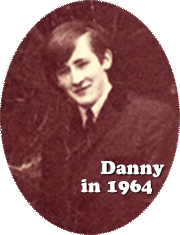
by Danny Gallagher of The Solitaires/Traction/Frosty Moses
I suppose any musician who persevered enough to break on to the professional circuit could tell of great gigs and meetings with big names, but to the historian it wouldn't really give them a real flavour of the energy that was the soul of the desire to do it in the first place.
With that in mind, Danny Gallagher has taken us back to his particular early journey. Danny is still in "the business" and is the Sound Engineer at The Roadhouse Venue in Birmingham. (BrumBeat)
Arrival in Babylon...
"In 1957 at the age of 11, my eyes saw for the first time, the City of Birmingham having just arrived from the lovely County Donegal in Eire. I was green as the fields I had just left behind. Although Birmingham has been a great model of multi-cultural existence for many years, the mood of those times was a little less welcoming with job vacancies stating Irish and black people need not apply!
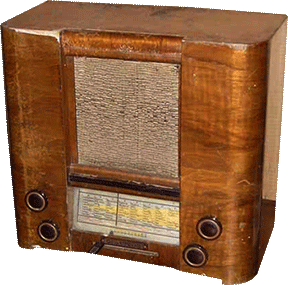
Immigration to the UK had just started and there was a large contingent of Irish that had come over for the massive building projects underway in the city and I guess there was some concern about other nationalities taking jobs that fuelled that particular fire.
There was, a young local Brummie lad called Keith Poulton who became a very good friend to me. Approaching our teens we both found we had an interest in music and used to while away the hours listening to Radio Luxembourg, with its signal fading in and out behind a sea of static. TV was in its early years and broadcasting hours started at six o'clock in the evening and finished at ten.
Oh lucky man...
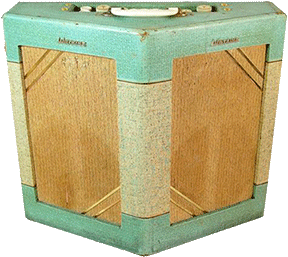
Keith had lovely parents and he also had the good fortune to be showered with practically anything he wanted from them. Pretty soon after him telling them he had an interest in playing guitar, along came an acoustic guitar which was fitted with an Elpico type pick up, a Linear Amp and separate speaker.
His parents thought he showed some promise so, in quick succession, he became the owner of a Hofner Colorama along with a Watkins Dominator AND a Watkins copycat echo chamber. The Dominator was the biggest and best amplifier available at the time so he was cutting edge - SEVENTEEN WATTS!
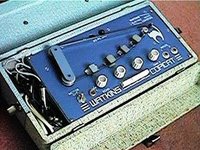
Being from an Irish family, you had to have a "party piece" and mine was playing the harmonica. I had learned from a very young age so because of my musical ability, Keith thought it would be a natural thing for us to form a group and I should be the bass player. I had no bass guitar and I knew that there was no chance of my parents, lovely though they were, buying any equipment for me despite how desperate I might be to play some rock and roll.
One day we were sat in Keith's bedroom playing records on his Dansette and saying how great we would be once we get our group together, when Keith had a "brilliant idea". We will make a bass guitar!
Even in those days he had a TV in his bedroom. It was a "stand alone" model. His parents had recently upgraded to something a bit more compact and had given the older one to him.
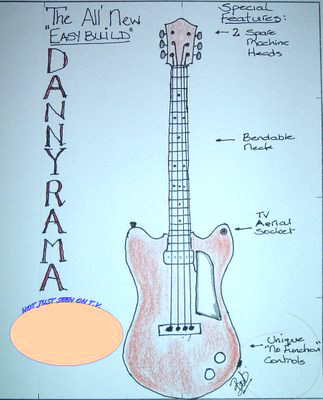
He broke the neck off his acoustic guitar and then SAWED the mahogany top off the TV for wood to make a body! I can't remember what the reaction from his folks was but I certainly knew what my parents would have said or done!
We placed his Colorama on the piece of mahogany and with some chalk, drew around the outline to give a body shape. I was quite good with my hands and in a couple of days I had it sawn out, shaped and sanded. I bolted the neck to the body and made a scratch plate from some old white plastic and glued that on too.
The pick-up from the acoustic did not have volume or tone controls so to give a better appearance to the guitar, I painted a couple of bottle tops and glued them to the guitar body. A rough bridge piece was made and we put on four bottom end E strings from Keith's normal guitar strings and I plugged into his old Linear Amp and we started practicing.
Over time we recruited a drummer Ronnie Bowyer, who had a bass and snare drum and other strange timpanic odds and ends to hit, and a singer Connie Grant, a great Irish lad who knew some guitar chords and had a "different" voice and was funny to the extreme. He would have us all in fits of laughter all the time.
We called ourselves "The Phantoms" and we learned some Shadows stuff and other prominent US artists' material, not played too well but enough to fire our interest to practice and learn more.
Growing up lessons...
My next piece of real musical education came via The Redcaps. We had been booked, for only our second gig, at The Irish Centre as their support band. It was memorable for a couple of reasons. Firstly whilst we were waiting to go on stage, the Irish compere announced to the crowd "Ladies and gentlemen, now for a group that not only play their instruments - but some of them make them as well!" Second reason... The Redcaps.
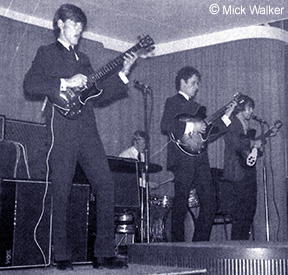
The Redcaps were a sensational group and that night I learned that four E strings don't make a bass guitar sound. They were the first "real" group I had seen and I was blown away. Their performance lit a fire in me and I could see a brighter future if I worked harder at my craft.
I started going to places where other good established groups played. The Springfield Ballroom, Alex Hooper's and The Star Ballroom were in my locality and it was at The Star where I first saw The Solitaires who were as energetic as The Redcaps but younger.
Over the next year, I started my first job and with my wages bought a second hand but "proper" bass guitar and amp. I would go and watch other bands like Denny Laine and The Diplomats, and Johnny Neal and The Starliners and watch their bass players for hints to improve my own performance. In due course The Phantoms ceased to be, with the four individuals making their own paths (although I was reunited for a short time with Keith many years later in Traction).
In 1963, I answered an advert in the Birmingham Evening Mail asking for a bass player and was shocked to find out it was for The Solitaires. The line up was Dave Bache - guitar/vocals, Maurice Press (Johnny Shane) - Lead vocals and George Mills - Drums. Their bass player was leaving to get married at 19! They had great equipment, a van and a manager.
Cool dudes!
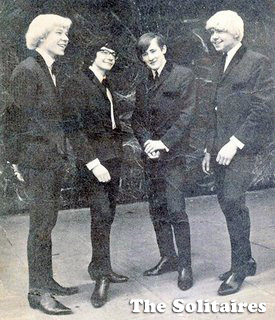
I seemed to fit in with their personalities and drive and although my playing, I felt, was still a bit naive, I learned their set whilst putting in many, many hours of extra practice. My playing improved so much under their influence over the next three months and when I found myself on stage at The Brum Cavern and The Ritz sharing the stage with The Redcaps and others I only used to watch, I was thinking that now I am in a band that could compete with them. Not only that, I was now professional and had achieved it through hard work and dedication.
The band was managed by the guitarist's father who also acted as road manager. Most of the bands at that time had some sort of gimmick to make them stand out from the crowd (with varying degrees of success). We decided that we would be so much more noticeable if we dyed our hair, so two of us had dyed black hair and the other two blonde - we thought we were the bees knees. We dressed in sharp suits and Cuban heeled boots.
Brumbeat on vinyl...
Through determined practice and I guess, some good management, we were asked to record a track for an upcoming LP! The album was to be called "BRUMBEAT" and featured various Birmingham groups. We were all very excited and full of nervous energy at the prospect. The LP was being recorded at Holick and Taylor studios at Handsworth, with the finished product being released on the Dial Records label. Our contribution was a self penned number titled 'Over You' written by guitarist Dave Bache. The other groups on the LP were:
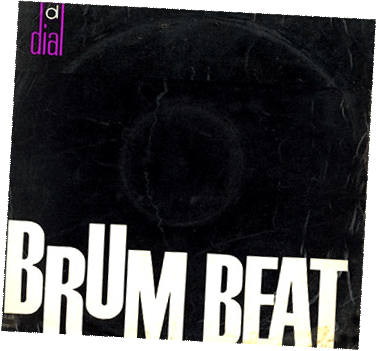
This was the FIRST Brumbeat LP. Decca Records released an album of the same name three months later.
The experience of that first recording session is a bit lost in the mist of time but in those days the recording equipment was not too good. You were always required to record at a low level of volume and the engineer would try and put some life into the recorded piece after the event.
The session was over in a blink. I think we had a run through of the song to enable the engineer to get a recording balance then we simply played the song a second time and that was that! There was never a thought of doing three or four takes to get some atmosphere into the record and needless to say we were never satisfied with the sound that emanated from the vinyl because we thought it couldn't match the energy of an on-stage performance.
That aside, I felt I'd reached a level that I had been willing to walk over broken glass to achieve. Being a performing musician is not about the amount or quality of gear that you possess, it's about the spirit and the soul, being inventive and never giving up when times are tough.
What made the music of the sixties so special? Music of the sixties was a catalyst for social change, alongside great literary offerings and open mindedness. Today's young musicians that are just starting their own particular journey are in for some shocks and a rough ride. Many of them will drop by the wayside but there just might be another "broke" Irish kid sawing up someone's sideboard right now!
The first place I had played was an Irish youth club in Sparkhill. It was a good hall to play in and had a stage and coloured lights. About a year before, I had become friends with a very pale looking, younger lad called Willie Hammond. Although there were some years between our ages he already had the makings of a very good guitarist and we could talk about music and guitars all the time without the age gap making a difference.
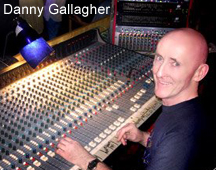
He was the only English kid in a group of Irish lads and was given honorary Irish status by them and me. I introduced him to the guy that ran the youth club and who had booked The Phantoms to support The Redcaps - Tom Moore. Willie went on to be lead guitarist for The Uglys - enough said!"
Danny Gallagher
Danny Gallagher passed away on March 3, 2019.
Copyright © D. Gallagher
"Dannyrama" original illustration Copyright © Bullsheadbob